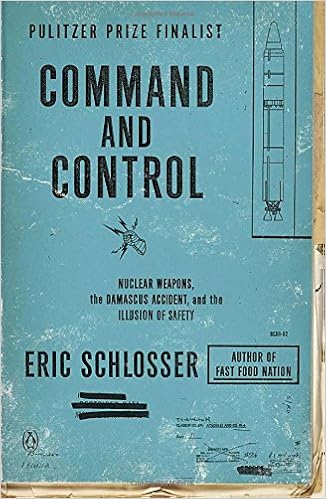I am a big fan of Schlosser's expose on fast food and had read an excerpt of this work, so I have long been looking forward to getting down to reading it. I was not disappointed. Command and Control revolves around an accident involving a Titan II missile silo in 1980, but around that story, Schlosser also tells the story of the American nuclear weapons program and of the dangers that accompany it, most specifically as related to accidents.
The Titan II accident dealt with in detail began with a routine maintenance operation, a man dropping a wrench and it hitting the missile, tearing a hole in it such that fuel began to pour out. It ends with an explosion. In between are tens of hours of terror, consternation, and planning. The escaped fuel leads to heavy amounts of toxic gas in the silo, enough that the command center feels a need to abandon the structure, this despite the fact that they sit behind several blast doors that can supposedly withstand a massive explosion, but gas seeps, and nuclear explosions are, well, you know, sort of big, big enough that one doesn't want to test such doors.
Outside, Air Force personell discuss what to do. They forge plans. Few of them actually do anything. The sherrif of the nearby town warns people to get away, even though the Air Force largely says that it has things under control. The sherrif knows better, from an accident a few years before involving a toxic oxidizer that killed lots of cattle and made many people sick. News crews arrive. Information given to the public is sparse.
Meanwhile, there's a general sense of dread and panic among the military people in the know. The fuel leak is slowly draining the bottom of the missile, making a vacuum. Above this vacuum is oxidizer, even more toxic than the fuel. It will crush the bottom of the missile like a tin can at some point, and the result will be an explosion. And above that are nuclear warheads, and one explosion might well set off the other. Over the course of several hours, a plan is forged. The silo doors will be opened in an attempt to disappate the fuel fumes and allow workers to go down and patch up the leak.
And then there's that explosion. When it happens, it is gut-wrenching. I'd thought the sheer number of characters Schlosser introduces would mitigate against one's feelings for them, but that is not the case with those who are hurt.
In between the account of the accident is a history of America's nuclear arsenal--and of the accidents in which it has been involved. One of the most harrowing involves another silo that catches fire in which fifty-three men are trapped and killed. Another involves the accidental dropping of a nuclear bomb over North Carolina in which every failsafe but the very last fails to prevent detonation.
But despite such accidents, thousands of them, the military continues to use the weaponry, even that which is questionable in terms of safety, and often it fights against safety precautions because of the added cost. Some accidents don't involve the warheads themselves but the early warning systems. In one case, a computer malfunctions and tells U.S. military people that the Soviet Union has launched an attack. Only because the head of the Soviet Union is actually in the United States at the time do experts realize that the computer has a bug.
And then there are the various military strategies the United States has during the Cold War. The main one involves essentially sending over so many missiles in retaliation for an attack that some places are being bombed three times over. The Cuban Missile Crisis is recounted, showing just how close the two nations came to war--but often that closely was mirrored by accidents like the one recounted above.
What's scary, Schlosser notes is that the United States probably has one of the safer aresenals. Other countries in possession of nukes don't have as good of a safety record, as bad as the American record is. And all it takes is for one of those thousands of accidents to get out of hand.
Wednesday, January 11, 2017
On “Command and Control” by Eric Schlosser *****
Labels:
Books,
Eric Schlosser,
Five-Star Nonfiction,
Nonfiction
Subscribe to:
Post Comments (Atom)







No comments:
Post a Comment